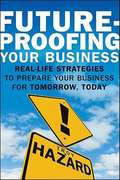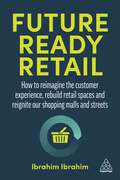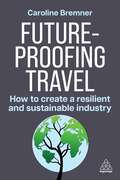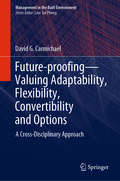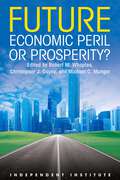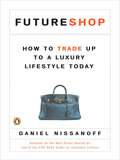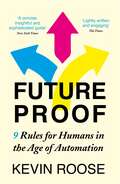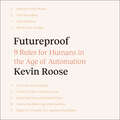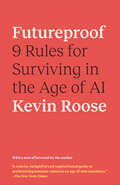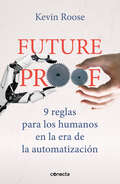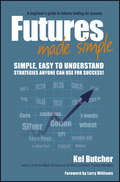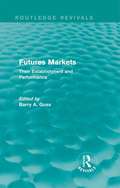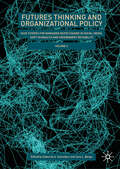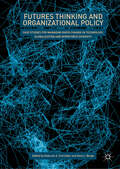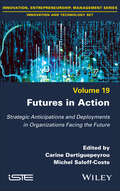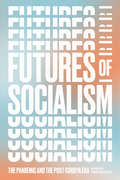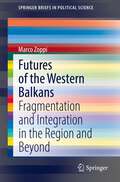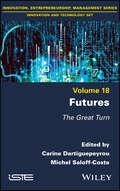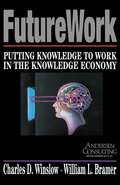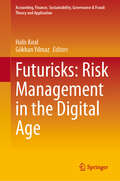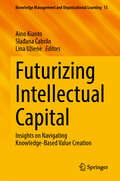- Table View
- List View
Future-Proofing Fuel Cells: Critical Raw Material Governance in Sustainable Energy
by Robert Lindner Martin David Stephen M. Lyth George F. HarringtonAs the world accelerates towards a renewable energy transition, the demand for critical raw materials (CRMs) for energy generation, conversion, and storage technologies is seeing a drastic increase. Such materials are not only subject to limited supply and extreme price volatility but can also represent serious burdens to the environment, to human health, and also to socio-political systems. Taking an interdisciplinary perspective, this book provides a novel perspective on the discussion about material dependencies of energy technologies. It examines CRMs use in fuel cells, an emerging energy conversion technology, and discusses governance strategies for early-stage fuel cell development to predict and avoid potential issues. This will be an invaluable resource for researchers in energy studies, engineering, sociology and political science as well as those with a general interest in this field looking for an accessible overview.
Future-Proofing Your Business
by Troy HazardAfter years as a consultant to some of the world's biggest brands and having owned ten companies himself, Troy Hazard has learned crucial lessons on predicting potential business issues before you experience them. Now Troy offers you the skills to prepare your business for a better future. Along with his stories of what works, he also shares his experiences of what doesn't work. With a mix of entertaining real life extracts, client case studies, and personal experiences, Future Proofing Your Business offers potent and refined tools that have been road tested in real-world situations and aren't taught in business school. Learn how to turn obstacles into opportunities Break down business barriers created by bad belief systems Develop powerful leadership skills through stronger personal awareness Know if you're driving your business into the future or into the ground Discover how to make change a consciousness not just an action. Understand your future through a greater understanding of yourself All through the author's extensive experience in his own companies and as a consultant for major world brands Troy's philosophy on how to future-proof your business is anchored in one core belief: "Business happens in cycles. Your ability to manage these cycles successfully lies in how you interpret information from the past and deal with it in the present, to be more resilient through cycles of the future. " Troy Hazard (San Diego CA. ; www. troyhazard. com) has founded and nurtured ten businesses over two decades, turned around businesses that were experiencing enormous losses, and consulted to countless successful companies around the world. These business talents earned him international respect, so much so that he was elected by the world's foremost business leaders for the role of Global President of the Entrepreneurs' Organization. For over a decade Troy has been a host and regular guest on many national television and radio shows as a business commentator and a feature writer for magazines. More recently he has become a regular voice of authority on The Biz Television Network, the CBS Talk Radio Network, and the Business Talk Radio Network, and is a regular writer in publications across the country.
Future-Ready Retail: How to Reimagine the Customer Experience, Rebuild Retail Spaces and Reignite our Shopping Malls and Streets
by Ibrahim IbrahimTraditional shops are facing challenging and unprecedented times. Future-Ready Retail explains how changing consumer needs, the impact of digital and the issues around health, wellness and distancing have transformed retail and provides compelling solutions to help reimagine the high street and out-of-town malls. Conventional high streets, shopping arcades and retail malls throughout the world no longer attract the crowds needed to sustain them as successful commercial spaces. Suffering from the effects of online shopping, changing consumer attitudes and expectations, and the legacy impact of social distancing, there's a sense of urgency and the need to address the decline in physical retail. Future-Ready Retail provides in-depth analysis of how consumers, health, data and new technologies will continue irreversibly to shake up physical shops and permanently shape the future of traditional retail. Arguing that to be future-ready, retail needs to be driven by people and places, not solely real estate, the book explains how brands can develop strategies to create shops whose main purpose is to recruit, retain and delight customers. Featuring case studies from successful global brand, retail futurist and designer Ibrahim Ibrahim identifies key retail-cultural trends, shows why it's important to make retail space physically smarter and how to use touch points such as social, website and apps alongside the physical space, to achieve a seamless, enjoyable and profitable retail experience.
Future-proofing Travel: How to Create a Resilient and Sustainable Industry
by Caroline BremnerEvolving traveller expectations, pressures to reduce emissions and a need to preserve popular destinations from over-tourism and climate change are creating untold disruption in the travel industry. The industry cannot continue to grow unchecked and wholesale transformation is required.Future-proofing Travel considers current travel trends in consumer expectations for greener and more experiential travel alongside the demands from local communities and industry-led initiatives to meet government pledges of lower emissions. It explores how business leaders in tourism and hospitality services must adapt their offerings to remain relevant in a competitive environment where sustainability and technology are no longer nice-to-haves. Explore data-driven and holistic solutions for travel industry professionals to transform their businesses to be more purposeful and sustainable with this book.While there is no one pathway to success, Future-proofing Travel shows how travel companies and destinations are currently adapting their practices to be more impact conscious while also elevating the traveller experience. Using real-world examples from leading brands such as Airbnb, Marriott, TUI and Intrepid Travel, this book maps out how travel brands and destinations can accelerate their positive actions through digitalization and green innovation to regenerate local communities, retain consumer loyalty and increase long-term profits sustainably into the future.
Future-proofing—Valuing Adaptability, Flexibility, Convertibility and Options: A Cross-Disciplinary Approach (Management in the Built Environment)
by David G. CarmichaelThis book presents a unifying approach to the valuation of incorporated flexibility. Flexibility, in general terms, recognizes future uncertainty and refers to being proactive now so as to secure the future possibility of being able to adapt, convert, or generally introduce a change, if it is worthwhile to do so at the time. That is, deliberate provision is made now in order to have the ability (but not the obligation) to adapt, convert, or change in the future; this change is discretionary, and depends on future circumstances. The applications demonstrated here cover engineering, building, housing, finance, economics, contracts, general management, and project management. The examples are as follows: designing/building features in infrastructure (including buildings and houses) such that the infrastructure can be adapted in response to future changes in climate, demographics, or usage; incorporating features in contracts such that the terms and conditions can be changed in response to changing situations; purchasing rights now such that options exist to buy or sell an asset in the future; structuring a financial investment agreement so that its terms and conditions can be changed in the future; structuring project payments to provide future guarantees of revenue if needed; and designing an operation such that it can be expanded, contracted, abandoned, switched, changed, delayed, or deferred in the future. The level of required mathematics is kept at a very modest level: an undergraduate knowledge of algebra and probability is all that is required. Numerical examples, accompanied by readily understandable diagrams, illustrate the methods outlined. The formulations are kept straightforward and accessible for practitioners and academics alike.
Future: Economic Peril or Prosperity?
byWhat will the economy look like in fifty years? How will our lives as consumers and workers be transformed by the coming innovations in technology, the marketplace, and the workplace? How will changes in demographics and dependency affect our political system? Will economic freedom rise or fall? What, if anything, would greater prosperity do for one&’s total well-being?Future: Economic Peril or Prosperity? poses these and related questions to a diverse group of economists whose predictions will inspire thoughtful consideration and debate. As co-editor Robert M. Whaples writes in the introductory chapter, &“The predicted changes range from innocent innovations that will make life a bit more comfortable...to potentially chilling technologies that might strip our human dignity.&” Just as important as the book&’s predictions are its insights into how we should think about an uncertain future. As humorist and social critic P. J. O&’Rourke shows in his erudite chapter on self-fulfilling prophecies, wildly wrong predictions are not limited to the likes of a Nostradamous or a Karl Marx: even a Nobel laureate economist running a billion-dollar hedge fund can lose the farm (and other people&’s money) through an overly confident misreading of the economic tea leaves. And yet, perhaps only by delving more deeply into long-term forecasting, and reflecting on past mistakes, can we minimize the hubris that so often clouds the judgments of prognosticators in academia, business, and—perhaps especially—government. Informative, contentious, and at times inspirational, Future: Economic Peril or Prosperity? is an invaluable aid for anyone who understands the need to prepare for the future, even if that future cannot be fully anticipated.
FutureShop: How to Trade Up to a Luxury Lifestyle Today
by Daniel NissanoffThis is a book about change. In particular, it's about how our consumer culture is rapidly evolving to allow us to live better, richer lives for less. The catalyst to this change is eBay and similar sites that are quickly growing into mainstream shopping venues and creating unprecedented levels of liquidity for our everyday goods. The wave of the future will be temporary ownership-consumers will be able to buy what they really want because they'll be able to easily sell it when they are ready to upgrade to the next item on their wish list. Veteran Web entrepreneur Daniel Nissanoff's invaluable heads-up explores why this change is taking place and discusses what consumers and businesses can do in order to benefit from this new paradigm.
Futureproof: 9 Rules for Humans in the Age of Automation
by Kevin Roose'Kevin Roose provides a clear, compelling strategy for surviving the next wave of technology with our jobs - and souls - intact... Futureproof is the survival guide you need' Charles Duhigg, The Power of HabitIn this timely, counterintuitive, and highly practical guide to the age of A.I. and automation, a New York Times technology columnist argues that the key to success is making yourself more human, not less.The machines are here. After decades of sci-fi doomsaying and marketing hype, advanced A.I. and automation technologies have leapt out of research labs and Silicon Valley engineering departments and into the center of our lives. The world's biggest corporations are racing to automate jobs, and some experts predict that A.I could put millions of people out of work. But all is not lost. With a little effort, we can become futureproof. In Futureproof: 9 Rules for Machine-Age Humans, New York Times technology columnist Kevin Roose lays out an optimistic vision of how people can thrive in the machine age by rethinking their relationship with technology, and making themselves irreplaceably human.
Futureproof: 9 Rules for Humans in the Age of Automation
by Kevin Roose'Kevin Roose provides a clear, compelling strategy for surviving the next wave of technology with our jobs - and souls - intact... Futureproof is the survival guide you need' Charles Duhigg, The Power of HabitIn this timely, counterintuitive, and highly practical guide to the age of A.I. and automation, a New York Times technology columnist argues that the key to success is making yourself more human, not less.The machines are here. After decades of sci-fi doomsaying and marketing hype, advanced A.I. and automation technologies have leapt out of research labs and Silicon Valley engineering departments and into the center of our lives. The world's biggest corporations are racing to automate jobs, and some experts predict that A.I could put millions of people out of work. But all is not lost. With a little effort, we can become futureproof. In Futureproof: 9 Rules for Machine-Age Humans, New York Times technology columnist Kevin Roose lays out an optimistic vision of how people can thrive in the machine age by rethinking their relationship with technology, and making themselves irreplaceably human.(P) 2021 Penguin Random House Audio
Futureproof: 9 Rules for Surviving in the Age of AI
by Kevin RooseA practical, deeply reported survival guide for the age of AI, written by the New York Times tech columnist who has introduced millions to the promise and pitfalls of artificial intelligence. &“Artificial intelligence can be terrifying, but Kevin Roose provides a clear, compelling strategy for surviving the next wave of technology with our jobs—and souls—intact.&”—Charles Duhigg, author of The Power of Habit It&’s time to get real about AI. After decades of hype and sci-fi fantasies, AI—artificial intelligence—is leaping out of research labs and into the center of our lives. Millions of people now use tools like ChatGPT and DALL-E 2 to write essays, create art and finish coding projects. AI programs are already beating humans in fields like law, medicine and entertainment, and they&’re getting better every day. But AI doesn&’t just threaten our jobs. It shapes our entire human experience, steering our behavior and influencing our choices about which TV shows to watch, which clothes to buy, and which politicians to vote for. And while many experts argue about whether a robot apocalypse is near, one critical question has gone unanswered: In a world where AI is ascendant, how can humans survive and thrive? In Futureproof: 9 Rules for Humans in the Age of Automation, New York Times technology columnist Kevin Roose shares the secrets of people and organizations that have successfully navigated waves of technological change, and explains what skills are necessary to stay ahead of the curve today, with lessons like • Be surprising, social, and scarce• Resist machine drift• Leave handprints• Demote your devices• Treat AI like a chimp army Roose rejects the conventional wisdom that in order to compete with AI, we have to become more like robots ourselves—hyper-efficient, data-driven workhorses. Instead, he says, we should focus on being more human, and doing the kinds of creative, inspiring, and meaningful things even the most advanced algorithms can&’t do.
Futureproof: 9 reglas para los humanos en la era de la automatizacion
by Kevin Roose¿Qué significa ser humano en un mundo construido cada vez más por y para máquinas? Las máquinas ya están aquí; la automatización está sustituyendo los trabajos de las personas, la inteligencia artificial se ha colocado en el centro de los negocios y de nuestras vidas, y los algoritmos dan forma a todo lo que nos rodea. EnFutureproof: 9 reglas para los humanos en la era de la automatización, Kevin Roose rechaza la creencia popular de que paracompetir con las máquinas tenemos que parecernos a ellas: hipereficientes, basadas en datos, caballos de batalla al servicio del código. En su lugar, sostiene que debemos dejar a las máquinas ser máquinas y enfocarnos en hacer las actividades creativas, inspiradoras y con sentido que nos distinguen como seres humanos. Para lograrlo, nos comparte nueve lecciones para reflexionar, sobrevivir al cambio tecnológico y proteger nuestro futuro: Regla 1. Sé sorprendente, sociable y excepcional. Regla 2. Resiste el embate de las máquinas. Regla 3. Haz a un lado tus dispositivos. Regla 4. Deja huella. Regla 5. No seas un punto de conexión. Regla 6. Trata la IA como si fuera un ejército de chimpancés. Regla 7. Construye redes grandes y pequeñas. Regla 8. Aprende humanidades para la era de las máquinas. Regla 9. Arma a los rebeldes. Una visión pragmática y esperanzadora sobre cómo podemos defendernos del paso arrasador de la automatización y cómo alcanzar el éxito en la era de las máquinas al convertirnos en humanos irremplazables.
Futureproof: 9 reglas para los humanos en la era de la automatizacion
by Kevin Roose«Una guía concisa, esclarecedora y sofisticada para defender los valores humanos en la nueva era de las máquinas.» The New York Times Book Review Las máquinas ya están aquí. Los algoritmos dan forma a todo lo que nos rodea: los programas que vemos, la música que escuchamos, los productos que compramos o las relaciones que creamos. Y mientras seguimos inmersos en el eterno debate de si la automatización destruirá nuestros puestos de trabajo, ignoramos una pregunta importante: ¿Qué significa ser humano en un mundo diseñado cada vez más por y para las máquinas? En Futureproof: 9 reglas para los humanos en la era de la automatización, el columnista de The New York Times Kevin Roose rechaza la creencia popular de que para competir con las máquinas tenemos que parecernos a ellas: hipereficientes esclavos de los datos. Mantiene, en cambio, que debemos enfocarnos en desarrollar las actividades creativas, inspiradoras y relevantes que nos distinguen como seres humanos. Roose revela los secretos de las personas y las organizaciones que han sobrevivido al cambio tecnológico y explica cómo podemos proteger nuestro futuro con lecciones como: Regla 1. Sé sorprendente, sociable y excepcional Regla 2. Resiste el embate de las máquinas Regla 3. Haz a un lado tus dispositivos Regla 4. Deja huella Regla 5. No seas un punto de conexión Regla 6. Trata la IA como si fuera un ejército de chimpancés Regla 7. Construye redes grandes y pequeñas Regla 8. Aprende humanidades para la era de las máquinas Regla 9. Arma a los rebeldes Una guía pragmática y esperanzadora sobre cómo defendernos del avance arrasador de las máquinas y prosperar en la era de la automatización convirtiéndonos en humanos irremplazables. Reseñas:«Una clara y convincente estrategia para superarla siguiente ola de la tecnología con nuestros trabajos (y almas) intactos. Tanto si eres optimista como pesimista sobre el futuro, Futureproof es la guía de supervivencia que necesitas.»Charles Duhigg, autor de Más agudo, más rápido y mejor y El poder de los hábitos «Kevin Roose nos enseña cómo las personas podemos hacer frente individualmente al cambio tecnológico anteponiendo siempre la humanidad.»Andrew Yang, candidato demócrata a la presidencia de EEUU y defensor de la renta básica universal
Futures Made Simple
by Larry Williams Kel ButcherThe essential guide to trading futures, without all the fuss This uncomplicated guide for beginners proves that you don't have to be a financial wizard to successfully trade futures . . . and you don't have to hire a financial advisor to tell you what to do either. Instead, Futures Made Simple outlines the basic strategies that even novice investors can use to make money with futures. The book lays just what you need to know--what futures are, how the exchanges work, how to analyse the markets, and how to trade futures either on- or offline. An excellent entry-level guide to futures trading Written by a successful trader with almost two decades of experience in equities, futures, options, and other vehicles Features easy-to-understand examples and bulleted summaries of key points to make learning simple For investors at any level of experience who want to move into futures trading, Futures Made Simple offers expert advice and fundamental guidance for profitable investing.
Futures Markets: Their Establishment and Performance (Routledge Revivals)
by Barry GossFirst published in 1986, this book discusses many important aspects of the theory and practice of Futures Markets. It describes how they, at the time, grew to be an increasingly important feature of the world's major financial centres. Indeed, they adopted the role of being efficient forward pricing mechanisms and this was reflected by the interest of economists in the study of risk, uncertainty and information. Here, the contributors focus on areas that were of concern in the late 1980s such as feasibility, forward pricing and returns, and the modelling of price determination in Futures Markets. Evidence is drawn from twenty-five different commodities representing all the major commodity groups; and from all the world's major centres of Futures Trading.
Futures Thinking and Organizational Policy, Volume 2: Case Studies for Managing Rapid Change in Social Media, Shift in Wealth and Government Instability
by Zane L. Berge Deborah A. SchreiberThe case studies in this Volume 2 book support the premise that organizational policies are what ensure institutionalization and sustainability of futures thinking in corporations, non-profits, and educational institutions. Futures thinking here reflects a systems approach utilized by organizational leaders to observe and interpret signals of change or disruption, identify trigger points of impact, employ foresight methodologies to build scenarios of the future and plan action, and then ultimately translate/actualize the most viable scenarios into successful business outcomes. What is new in the field of futures thinking today is not the general source of change (i.e., technology, globalization, and workforce well-being), but the tumultuous level of disruption occurring due to three phenomena—explosive use of social media, shift in great wealth, and government instability. Scholars and practitioners alike will find the case studies in this book provide nuanced insights into such disruptions, as well as discussion of best practices to ensure successful business solutions.
Futures Thinking and Organizational Policy: Case Studies For Managing Rapid Change In Technology, Globalization And Workforce Diversity
by Zane L. Berge Deborah A. SchreiberThis book proposes that organizational policies are what ensure the institutionalization and sustainability of futures thinking in organizations. It presents several case studies from corporations and other institutions that describe effective use of foresight methods and internal policies to respond to rapid change. The case studies address changing trends in technology, globalization and/or workforce diversity, and the impact on the economic and political well-being of the organization. The editors also develop an organizational capability maturity model for futures thinking as well as providing questions for discussion that promote critical review of each case chapter. This book will inform scholars and organizational leaders how best to utilize foresight methodologies and organizational policies to sustain successful management strategies within futures thinking organizations.Chapter 9 is available open access under a Creative Commons Attribution 4.0 International License via link.springer.com.
Futures in Action: Strategic Anticipations and Deployments in Organizations Facing the Future (ISTE Invoiced)
by Michel Saloff-Coste Carine DartiguepeyrouIn order to think about the future and bring it to life, Futures in Action emphasizes the practical and pragmatic dimensions of foresight. This book makes it possible to develop a vision of the future, to anticipate significant changes and pinpoint the weak areas. Foresight helps to rally players around a common vision, influence strategic decisions, and inspire innovation and organizational transformation. Futures in Action brings together the expertise of contributors from a wide range of public and private organizations. The diversity of their contributions puts into perspective the implementation of foresight both in France and worldwide. Exploring the major lessons and questions to come, this book is for all those who are convinced of the need to anticipate and build the future by taking action today.
Futures of Socialism: The Pandemic and the Post-Corbyn Era
by Grace BlakeleyHow should the left respond to electoral defeat, the leadership of Keir Starmer and a global crisis?British politics is in an extraordinary place. Grace Blakeley introduces an indispensable collection of analysis and comment. In Futures of Socialism, Sam Gindin and James Meadway reassess socialist strategy after the coronavirus; Dalia Gebrial and Siân Errington debate austerity and precarity; Joshua Virasami and Simukai Chigudu explore anti-racism and the legacy of Empire; and Leo Panitch and Momentum co-founder James Schneider probe the limits of parliamentary socialism. Chris Saltmarsh assesses the prospects for an eco-socialist Green New Deal and Cat Hobbs argues for the ongoing centrality of public ownership to socialist policy. Futures of Socialism takes an in-depth look at the reasons for Labour&’s 2019 election defeat, with Unite&’s Andrew Murray on Labour&’s Brexit position, Tom Mills on the British media, Gargi Bhattacharyya and Jeremy Gilbert on better ways to build a political project, and Keir Milburn on generation left. The anthology also compares the fortunes of the British left with socialist movements overseas, in despatches from Europe and America. Blakeley draws on the talents of all sections of the post-Corbyn left to survey the prospects of &“a movement that has dominated the horizons of our lives.&”
Futures of the Western Balkans: Fragmentation and Integration in the Region and Beyond (SpringerBriefs in Political Science)
by Marco ZoppiThis Brief provides a survey of key political, social, and economic issues affecting the Western Balkans region. Taking a two-pronged conceptual approach focusing on fragmentation and integration, the volume highlights commonalities and differences in a number of simultaneous dynamics currently characterizing the region: Europeanization and EU access, market integration, and migration and socio-demographic transformations. Stressing the interconnectedness of these issues, the volume synthesizes key questions for the future of the region, such as the relationship between socio-demographic trends and economic development, the effects of depopulation on further EU integration, and the economic and political repercussions of enhanced intra-regional trade. Explicitly interdisciplinary, this Brief will be useful for researchers and students specializing in the Balkans and Western Balkans, post-socialist countries, European affairs, enlargement, foreign policy, international relations, regional studies, economics, economic transition, and socio-demographics.
Futures: The Great Turn
by Michel Saloff-Coste Carine DartiguepeyrouIn the same way as there are many futures, not just one, there are many ways to conceive and practice foresight. The challenge of the great turning point of our civilization is to free ourselves from our prejudices in order to imagine and build desirable futures. The process is, by nature, ethical and prospective. In a complex, uncertain and geopolitically transforming world, we must be open to the diversity of cultures and the different perceptions of the future. This requires us to reflect on the purpose and means of our societies. Futures proposes different cultural and ethical views on civilizational transformation by offering a rare, transnational panorama of the visions of the future in a European, American and Chinese context. Through numerous examples, this book illustrates how foresight is practiced and what this can achieve in strategic terms.
Futurework: Putting Knowledge to Work in the Knowledge Industry
by Charles D WinslowA company's success ultimately depends on each worker's completion of an infinite series of little "now's". To achieve peak efficiency in a climate of "now", organizations must use all possible resources to support each individual's performance of various tasks. "Integrated Performance Support" (IPS), a new concept developed by Andersen Consulting, helps employees perform to their optimum capability. This book shows how IPS builds specific information and tools directly into business processes and systems, enabling workers to independently solve problems on the job.
Futurisks: Risk Management in the Digital Age (Accounting, Finance, Sustainability, Governance & Fraud: Theory and Application)
by Halis Kıral Gökhan YılmazThis book explores the profound impact of digital transformation on enterprise risk management. It highlights the shifting dynamics of supply and demand influenced by technological advancements, evolving customer preferences, geopolitical tensions, and regulatory developments. Beyond building digital infrastructure, digital transformation requires organizations to rethink strategic decisions, business processes, and the legal and ethical frameworks governing operations. The book identifies critical risk areas amplified by digital transformation, including cybersecurity, data privacy, compliance, labor, third-party dependencies, business continuity, environmental sustainability, and regulatory challenges. The book underscores the need for organizations to move beyond superficial digital updates and adopt transformative approaches to business models, processes, and structures. It offers actionable strategies for leaders to navigate the complexities of rapid technological change and turn emerging risks into opportunities.
Futurize! Dealing with Megatrends and Disruptors: A Handbook for the Future-Oriented CEO
by André de Waal Julie LinthorstThe future will bring only more megatrends and disruptions. With the guidance of this book, which centers around the authors’ years-of-research-backed high-performance organizations (HPO) framework and includes the unique self-assessment tool Futurize! Diagnosis, business leaders and organizations will be prepared and truly ‘future ready.’ The next two decades will present massive challenges for organizations, as they navigate the need for sustainable development against a complex backdrop of factors such as increasing inequality, resource scarcity, continued globalization, and the ever-increasing speed of technological advancement. This book will help business leaders and organizations set priorities and make decisions so that not only do they honor commitments to the United Nations Sustainable Development Goals, but also become more future ready by: identifying the megatrends and disruptors which impact organizations now and will in the future specifically outlining how those megatrends and disruptors will impact organizations showing how organizations can deal with this impact in practical terms. This book is a must for management teams, aspiring leaders, and professionals and students interested in the future of work, human resource management, and innovation.
Futurizing Intellectual Capital: Insights on Navigating Knowledge-Based Value Creation (Knowledge Management and Organizational Learning #15)
by Aino Kianto Slađana Čabrilo Lina UžienėThis book collects the ground-breaking ideas of top IC scholars on how to futurize IC theory and practice. Keeping the future in focus and searching for answers to fundamental questions related to the development of IC theory and practice that foster sustainability and societal wellbeing, this book provides new insights and perspectives concerning the nature and scope of IC, its effective management mechanisms, and the potential impact of IC on organizations and societies. The carefully curated 16 chapters by leading thinkers in the field address the key areas of future-proof IC research and practice: the complex and dynamic nature of IC, the role of IC in social ecosystems and its potential in facilitating smart social growth, the dynamic interplay between artificial intelligence and IC, and alternative paradigms for optimizing the transformative power of IC while prioritizing sustainability, social equity, and holistic wellbeing. The book inspires new thinking by breaking old thought patterns, making new connections, and generating fresh perspectives on IC. Serving as a catalyst for future global dialogue, the book guides scholars and practitioners on how to align IC theory and practices with future economic, social, and technological changes, inspires experimentation, and opens up new perspectives for the development of IC theory and practice that should contribute to the global societal transformation, sustainable growth, and peace.
Fuyao Glass America: Sourcing Decision
by Willy ShihIn today's global economy, what are the factors that go into production location choice? This case is set in the world's largest automotive glass producer as it expands from China into the United States. To meet a very aggressive cost target, management is faced with the alternatives of fulfilling the contract from its new Ohio factory, which can only produce above the target cost currently because it is still on a learning curve, or it can fulfill from its Tianjin, China factory which can produce below the cost target but will incur extensive shipping costs and require a far great amount of inventory holding. This case examines a core question facing managers who want to produce physical products for world markets.

